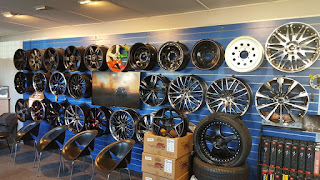How a Vehicle's Performance Depends on Tyres?
When it comes to a vehicle's performance, many factors come into play. The engine, transmission, suspension, and aerodynamics all play crucial roles. However, one element often overlooked but equally important is the vehicle's tyres. Your tyres are the only part of your car that makes direct contact with the road, and they can have a significant impact on your vehicle's performance, safety, and fuel efficiency. If you want any kind of information, you may contact the experts of tyres in Seven Hills.
The Anatomy of a Tyre
Before we dive into the intricate relationship between tyres and a vehicle's performance, let's start with the basics. A tyre is a complex piece of engineering, consisting of several key components:
Tread: The outer layer of the tyre that makes contact with the road. The tread pattern and depth play a crucial role in traction and handling.
Sidewall: The side of the tyre that connects the tread to the rim. Sidewalls provide structural support and influence a tyre's handling characteristics.
Bead: The inner edge of the tyre that securely fits onto the wheel's rim.
Belts: Layers of steel or other reinforcing materials that provide strength and stability to the tyre.
Inner Liner: A layer of rubber on the inside that keeps the tyre airtight.
Now that we have a basic understanding of tyre anatomy, let's explore how tyres impact a vehicle's performance:
Traction and Grip
Tyre traction is perhaps the most crucial factor when it comes to a vehicle's performance. Tyres provide the grip needed for acceleration, braking, and cornering. The tread pattern, rubber compound, and tread depth determine a tyre's ability to maintain traction in various conditions.
Tread Pattern: The design of the tread pattern influences how well the tyre grips the road. Different tread patterns are suited for different driving conditions. For instance, summer tyres often have wide, shallow grooves for dry roads, while winter tyres have deep, aggressive treads for snow and ice.
Rubber Compound: The type of rubber used in a tyre affects its grip. Softer rubber provides better traction but may wear out faster, while harder rubber lasts longer but sacrifices some grip.
Tread Depth: Tread depth is essential for maintaining grip, especially in wet or snowy conditions. As a tyre's tread wears down, its ability to channel water and provide traction decreases.
Handling and Stability
Tyre size, construction, and sidewall stiffness greatly impact a vehicle's handling and stability. High-performance vehicles often come equipped with wider, lower-profile tyres that provide better cornering capabilities. Conversely, trucks and SUVs may use taller, more robust tyres for off-road traction and stability.
Fuel Efficiency
Believe it or not, your choice of tyres can affect your vehicle's fuel efficiency. The rolling resistance of a tyre plays a significant role in how much energy your vehicle needs to move forward. Low rolling resistance tyres reduce the effort required to move, improving fuel economy. This is why many modern vehicles come with eco-friendly tyre options to maximize miles per gallon.
Ride Comfort and Noise
Tyre choice can also influence ride comfort and cabin noise. Softer tyres with more sidewall cushioning can provide a smoother ride, while stiffer tyres may transmit more road imperfections to the vehicle's occupants. The tread design can also impact noise levels, with some tyre models engineered to reduce road noise for a quieter driving experience.
Load Capacity
The load-carrying capacity of a tyre is essential, especially for vehicles that frequently carry heavy loads or tow trailers. Tyres must be selected based on the vehicle's weight and load requirements to ensure safety and performance.
Tyre Pressure
Maintaining proper tyre pressure is crucial for optimal performance. Under-inflated tyres can lead to decreased fuel efficiency, reduced handling, and increased tyre wear. Over-inflated tyres may provide better fuel economy but sacrifice ride comfort and traction.
Weather and Seasonal Considerations
Tyre performance can vary significantly with weather conditions. Summer tyres excel in warm, dry conditions but perform poorly in snow and ice. Winter tyres are designed for cold and snowy weather, providing superior traction. All-season tyres aim to strike a balance between the two.
Conclusion
In the world of automotive performance, tyres are often an unsung hero. They play a vital role in traction, handling, fuel efficiency, and overall safety. Choosing the right tyres in Seven Hills for your vehicle and driving conditions can significantly enhance your driving experience and, more importantly, keep you safe on the road. So, the next time you think about upgrading your vehicle's performance, don't forget to consider the crucial role that tyres play in the equation.
Disclaimer: This is a generic Information & post; content about the services can be changed from time to time as per your requirements and contract. To get the latest and updated information, contact us today or visit our website.
.jpg)
.png)

Comments
Post a Comment